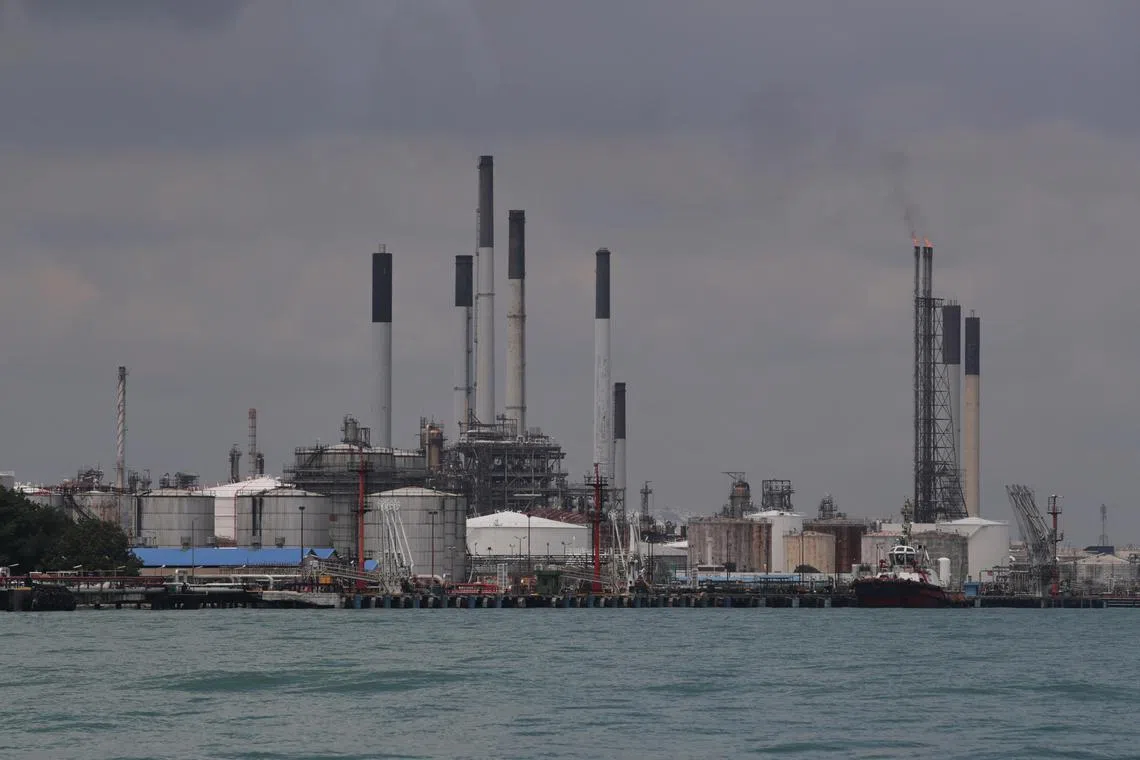Singapore offers carbon tax rebates of up to 76% for refiners, petrochemical firms, sources say
Sign up now: Get ST's newsletters delivered to your inbox

The tax concessions will provide a significant buffer for refiners’ profit margins amid growing competition with newer plants in China and the Middle East.
PHOTO: ST FILE
Follow topic:
SINGAPORE - Singapore is offering refiners and petrochemical companies rebates of up to 76 per cent for its planned carbon tax
The tax concessions will provide a significant buffer for refiners’ profit margins amid growing competition with newer plants in China and the Middle East.
Carbon tax costs are estimated at between 80 cents and $1 per barrel of crude input basis for refineries based on the $25 per tonne of emission rate, according to consulting firms FGE and Wood Mackenzie. That would be close to a quarter of refiners’ current margins in Singapore.
Under Singapore’s new taxation rate for carbon emissions, which took effect on Jan 1, businesses that emit more than 25,000 tonnes of carbon annually pay $25 per tonne until 2025, compared with $5 per tonne from 2019 to 2023.
The rate will subsequently go up to $45 per tonne in 2026 and 2027, and between $50 and $80 per tonne by 2030, the Singapore Government announced in 2022.
Major companies in the refining and downstream sectors have been given rebates on a transitional basis to soften the added tax burden, lowering the final costs to between $6 and $10 per tonne of emissions, three of the sources said.
These refineries and downstream businesses will still have to pay an outright $25 per tonne of carbon emission tax and subsequently apply for the rebates, according to the terms and conditions set out by the Government, a fifth source said.
Singapore has three refineries with a combined capacity of 1.119 million barrels per day, currently operated by Shell, ExxonMobil and Singapore Refining Company (SRC), a joint venture between Chevron and Singapore Petroleum Co, wholly owned by PetroChina.
While the disruption of Russian oil trade amid the Ukraine war and post-pandemic demand boosted refining margins between 2020 and 2022, these profits have halved from peak levels reached in February.
Shell declined to comment, while an ExxonMobil spokesperson said: “As a matter of practice, we do not discuss confidential matters.”
An SRC spokesperson said: “The Singapore Refining Company remains committed to support the Singapore Government’s policies through close partnership and continued dialogue.”
The concessions will likely be in place at least for 2024 and 2025, one of the sources said, adding that the “discounted” rate will be back on the table for discussion in 2026 or after.
Singapore introduced a transition framework in 2023 to support companies in emissions-intensive trade-exposed sectors such as chemicals, electronics and biomedical manufacturing in their energy transition.
“The allowances will only be provided for a proportion of the companies’ emissions, and are based on internationally recognised efficiency benchmarks where available, or the ambition and robustness of companies’ decarbonisation plans,” a spokesperson for the Ministry of Trade and Industry told Reuters in an e-mail.
“Their remaining emissions will continue to be subject to the prevailing headline carbon tax rates.”
The duration of this transition framework will depend on the development of carbon prices internationally and the progress of decarbonisation technologies, he said, adding that companies will be given sufficient notice in advance of changes to facilitate business planning.
A spokesperson for the National Environment Agency (NEA) said earlier that, in general, the carbon tax would have to be paid in the year following the reporting year “because of the time needed to compile the emissions data and independently verify the total emissions of the reporting year”.
Companies currently have the option to also offset up to 5 per cent of their taxable emissions using international carbon credit
This hefty increase in carbon taxes has been a hot topic in Singapore’s refining sector, following the sale of Shell’s flagship Bukom and Jurong Island refinery and petrochemical facilities

